A Team of Professionals
- Home
- A Multi Professional Team
Sport medicine doctors, osteopaths, physiotherapists, hydrotherapists, sport scientists and rehabilitation professionals: Isokinetic staff
The Isokinetic staff is composed of a multidisciplinary team that seek to work in an integrated way: over 200 professionals collaborating across 8 centers in Italy and in London. All sharing the same values and know how.
One of the main differences between Isokinetic centres and other sports injury rehabilitation or physiotherapy clinics is the constant presence in the clinic of doctors specialised in sports medicine and rehabilitation, and a medically driven recovery process.
Every patient who starts a rehabilitation process in one of our rehabilitation centres is followed from the very beginning by a “case manager“, a specialist doctor evaluating, after the initial consultation, the clinical situation, and making a diagnosis. The doctor will then design a tailor-made treatment protocol to be shared with you, and with the rehabilitation specialist you are assigned.
The doctor will always supervise and check your progress until clinical outcome and goals are achieved.

The Isokinetic Medical Group is composed of about 50 doctors who interact with a multidisciplinary team of over 75 experts in sports injury rehabilitation: physiotherapists, hydrotherapists, movement specialists, physical reconditioning specialists, osteopaths and chiropractors and other team members specialised in physical re-education with proven experience in helping patients fully recover.
The constant presence of doctors in the Isokinetic clinics and the proactive communication with the whole rehabilitation team, helps to transform what might just seem like a series of manual treatments and exercises into a complete, clinically safe treatment pathway.
To ensure the Isokinetic care experience is more comfortable and accessible, over 50 receptionists and administrators are committed every day to better meet the practical and organisational needs of patients.
The Doctor
The Isokinetic Doctors, physician specialised in Sports Medicine or Rehabilitation Medicine. We call your Doctor – the “Case Manager”.
Case Managers are involved in all stages of the treatment program. The first step in the process is the initial consultation, after which the doctor will create a personalised rehabilitation programme for you. Even if you already had an opinion, their responsibility is to visit you, confirm the diagnosis and set the right program for you.
Your Case Manager will choose your Rehabilitation Specialist depending on the exercises you will need to do, although they will be available throughout your rehabilitation and will monitor your improvements, keeping you informed of your progress along the way. Most importantly, it is Case Manager’s responsibility to inform patients when their recovery is complete.
The Rehabilitation Specialist
The Rehabilitation Specialist is probably the person within Isokinetic you will spend the most time with. They are responsible for Patient rehabilitation therapy in the pool, gym, Green Room or on the rehabilitation field. They look after Patients using the Isokinetic Know How, which means they not only have to treat the Patient, but also do their best to achieve Maximum Functional Recovery Possible. They are also there to motivate whenever you need a push. For this reason, we carefully select only the most patient-friendly and well-trained Rehabilitation Specialists and full qualified chartered physiotherapists to ensure the Patient can get the most from the rehabilitation sessions. In addition to their role as your ‘personal guide’ of sorts, each Rehabilitation Specialist is also a fully qualified physiotherapist capable of performing manual therapies where necessary.
The Clinical Administrator
The Clinical Administrators should be your first point-of-call for any and all information. On your first arrival, a Clinical Administrator will take you to your initial consultation with the Case Manager and bring you back to reception afterwards to organise future appointments and book rehabilitation sessions. They are always there to help you, and deal with any logistical, organisational and administrative requests.
The Patient’s triangle
The role of medical specialists and rehabilitation experts in the Isokinetic recovery protocols
Sports doctors, rehabilitation physicians, osteopaths, physiotherapists, hydrotherapists and other rehabilitation experts: the Isokinetic team includes very different but complementary professional staff.
Here is a short guide to learn more about their specific skills and their role in rehabilitation programmes.
Who is and what does the sports doctor do?
The sports doctor is a graduate in medicine specialised in sport and exercise medicine. They take care of all the injuries associated with any type of sport, both professional and amateur.
The sports doctor has expertise in orthopaedics, rheumatology, postural, traumatology and is able to assess whether injury or dysfunctions of the musculoskeletal, respiratory and cardiovascular systems will stop you participating in all types of sports.
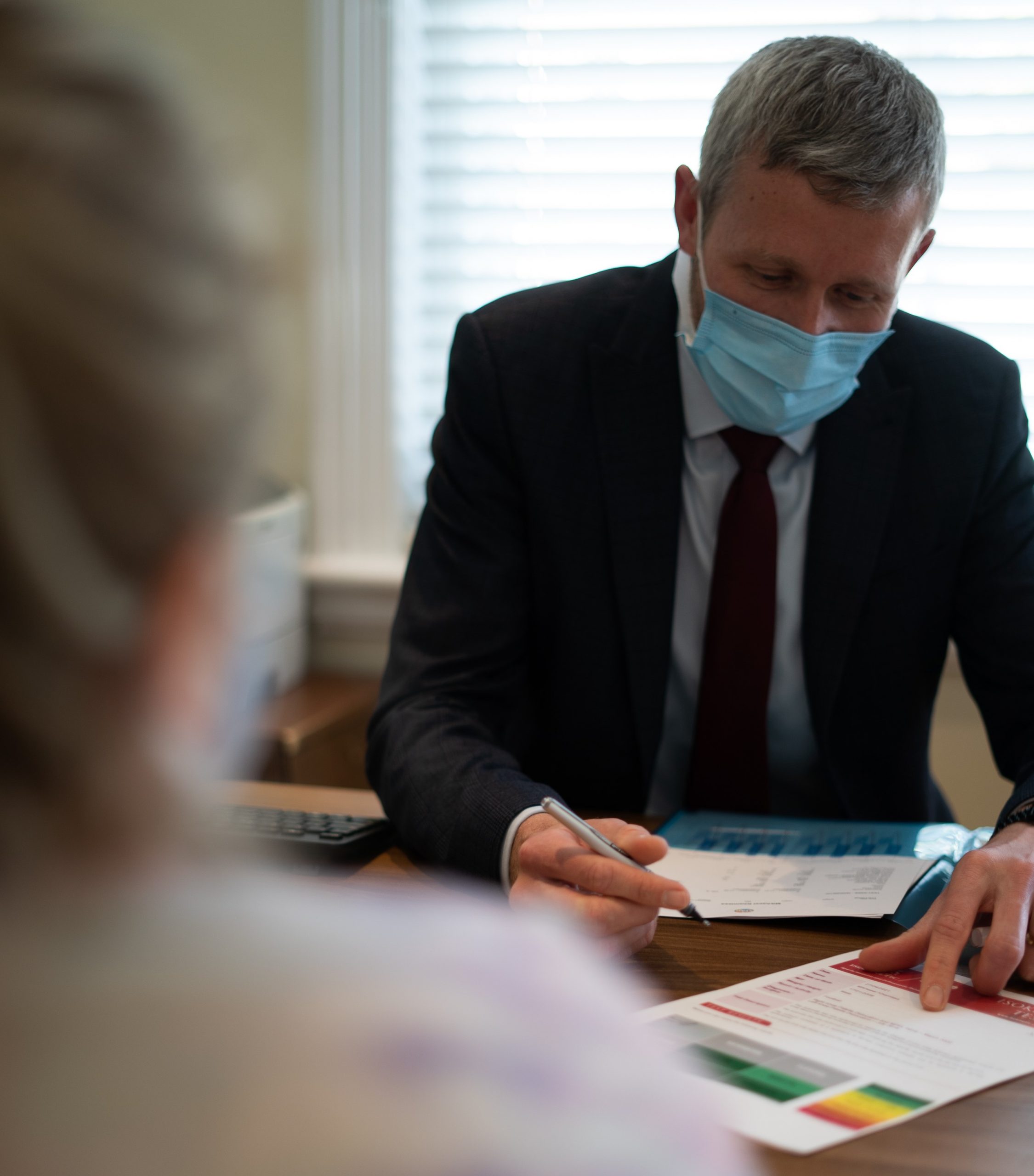
The sport and exercise consultant:
manages sports injuries with conservative treatment methodology
works hand in hand with orthopaedic surgeon where necessary
prescribes therapeutic exercise aimed at treating chronic diseases
can order xray, MRI or other diagnostics, including bloods
supports the sportsperson during athletic training
can provide information on nutrition and its integration to improve sports performance
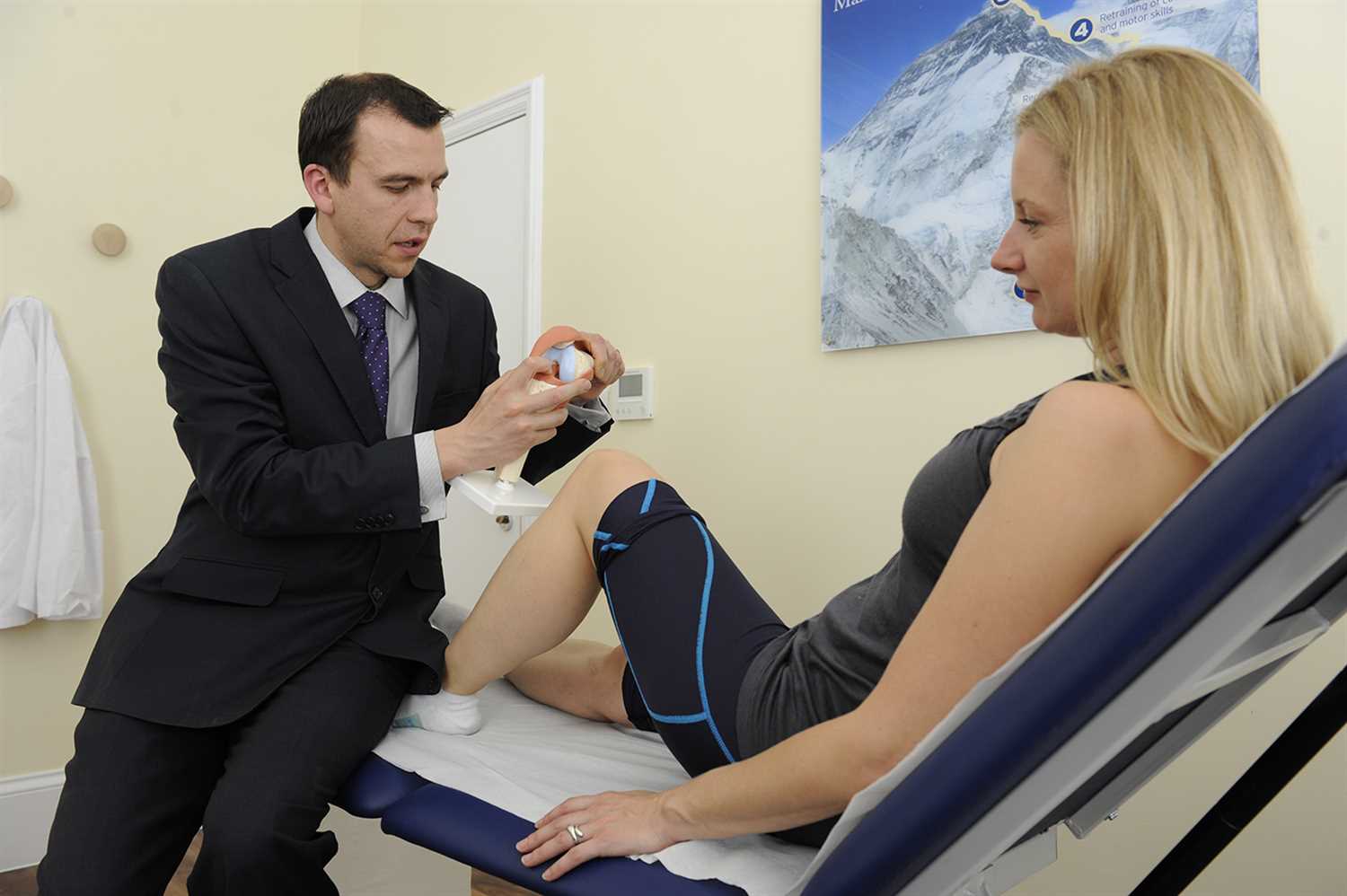
Who is and what does the Physiatrist do?
The physiatrist is a specialist doctor or a graduate in medicine, specialised in Physical Medicine and Rehabilitation.
He/she deal with issues related to posture, movement and functional limitations due to pathologies, traumas or chronic disorders.
He/she is a specialist doctor who has interdisciplinary skills in orthopedics, rheumatology, postural, sports and neurological medicine.
What is the difference between a sports doctor or physiatrist and an orthopaedic surgeon?
The orthopaedic surgeon is a doctor specialised in orthopaedics with specific skills on:
-
- anatomy and physiology of bones, cartilage, joints, ligaments, muscles and tendons
- pathologies and traumas of the musculoskeletal system (fractures, atroses, etc.)
- prevention of pathologies of the musculoskeletal system
Unlike the physiatrist, who deals with the pathologies of the musculoskeletal system with exclusively conservative treatments, the orthopedist can intervene surgically by operating in first person.
Even the physiatrist has orthopaedic skills and can prescribe the use of orthotics or braces and other aids to the rehabilitation process.
The doctors and the Isokinetic rehabilitation staff are always in contact with all the major orthopaedic surgeons and best hospital in orthopaedics in London, Italy and all around the world, to ensure rapid and complete transmission of clinical information relating to patients operated on or already followed by other specialists.
Don’t waste time with diagnosis, tests and consultations.
Isokinetic is located in Central London, Bologna, Milan, Rimini, Rome, Turin and Verona.
Choose the Isokinetic centre closest to you and book a consultation with a Sports Medicine specialist immediately, no waiting list.
Immediate availability to get your accurate diagnosis and start your recovery path
The role of physiatrists and sports and exercise consultants in the Isokinetic rehabilitation program
At the Isokinetic physiotherapy centres the Sports doctors and Physiatrists are available for you as the first point of contact.
The doctor:
undertakes the first consultation during which the clinical history taking and clinical testing takes place: the doctor asks a series of questions and performs tests to understand the source of the discomfort or pain
prescribes any diagnostic tests or further examinations (ultrasound, X-ray, MRI, CT scan) useful for a more complete diagnosis
prescribes and administers any specialised medical services, such as shockwave therapy, injections therapies or prescription of drugs
carries out the rehabilitative diagnosis, ie. Clarifies the origin of the pain or symptoms, outlines the clinical situation and the extent of the pathology or the damage caused by the trauma or injury
prescribes the personalised rehabilitation protocol and sets the recovery objectives to be achieved through integrated therapies and treatments
constantly supervises all phases of the treatment protocol with frequent follow-up visits
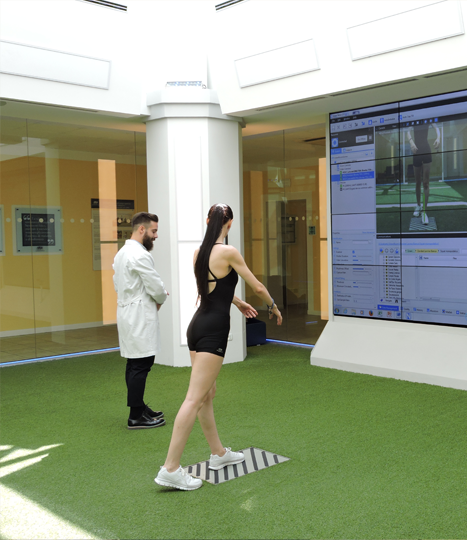
The Isokinetic rehabilitation specialists
Isokinetic’s rehabilitation specialists, always work as part of a multidisciplinary team of experts including physiotherapists, hydrotherapists, sport and exercise scientists, athletic trainers, strength coaches and osteopaths. Our strength really comes from being a group: with the experience of over 5 million treatments over the last 30 years, providing first class physiotherapy and sports injury treatment.
The rehabilitation team works according with the doctor’s personalised rehabilitation protocol and the doctor constantly communicates with them, sharing progresses and outcome of the treatments, adjusting with them the plan when the outcomes or progression are not exactly what they expected.
The rehabilitation specialists in Isokinetic provide a mix of manual treatments and techniques, and supervise exercise based therapy (exercise is medicine) necessary for the rehabilitation and resolution of problems affecting the musculoskeletal system.
These treatments can be manual or provided in conjunction with rehab equipment, depending on the patient’s needs and medical prescription. We recognise that for some patients there are other co-morbidities or underlying health conditions that might stop them historically from exercising. Our Sport and Exercise Medicine specialists are here to assist and ensure that you support in the right and safe way. We believe Exercise is Medicine.
Physiotherapists and all other rehabilitators in Isokinetic are skilled professionals in high-level functional rehabilitation, whose skills can range from the musculoskeletal system to the nervous, respiratory and cardiocirculatory systems, from the motor and kinesiology to the biological and biomechanical.
Difference between physiatrist or sports doctor and physiotherapist
The difference between physiatrist or Sports Doctor and physiotherapist consists not only in the nature of the title and skills, but also and above all in the role that these rehabilitation professionals hold in the various phases of the Isokinetic recovery process:
the physiatrist or sports doctor is a doctor and is the first figure, after the clinical administrator, that the patient encounters in Isokinetic rehabilitation centres. He /she:
1. evaluate the situation during the “initial consultation”
2. prescribes any specific tests and makes the diagnosis
3. draw up the personalised care protocol
4. follows the entire rehabilitation process of the patient through frequent follow-up visits and functional evaluation tests
the physiotherapist is a health professional who starts helping the patient after the doctor’s prescribing the personalised care protocol. He/she:
- deliver the rehabilitative treatments required by the medical prescriptions in order to relieve pain, swelling, inflammation, flexibility and treat injury, illness or disability through movement and exercise, manual therapy, education and advice
- carry out the rehabilitation activity and the targeted exercises in pool, gym, bio mechanical 3D lab (Green room) and outdoor rehabilitation field
- report results and progress of the treatments to the doctor, comparing notes with them to ensure the patient always a “tailored" approach to the needs and responsiveness to the therapies
Not just functional rehabilitation: Isokinetic multi-disciplinary team takes care of your well-being at 360°
“We do not treat the knee, but the patient who has knee pain”
In Isokinetic, shoulder or knee pain is not just a joint or ligament problem, but a condition that negatively affects the health of the patient as a person, compromising his physical, psychological and social aspects.
For this reason, we believe that a consistent and lasting physical recovery goes through a broader and more transversal care approach, aimed at restoring total psycho-physical well-being and promoting healthy lifestyles.
In the Isokinetic clinics you will find physiatrists, sports doctors, physiotherapists, athletic trainers, strength & conditioners and osteophats.
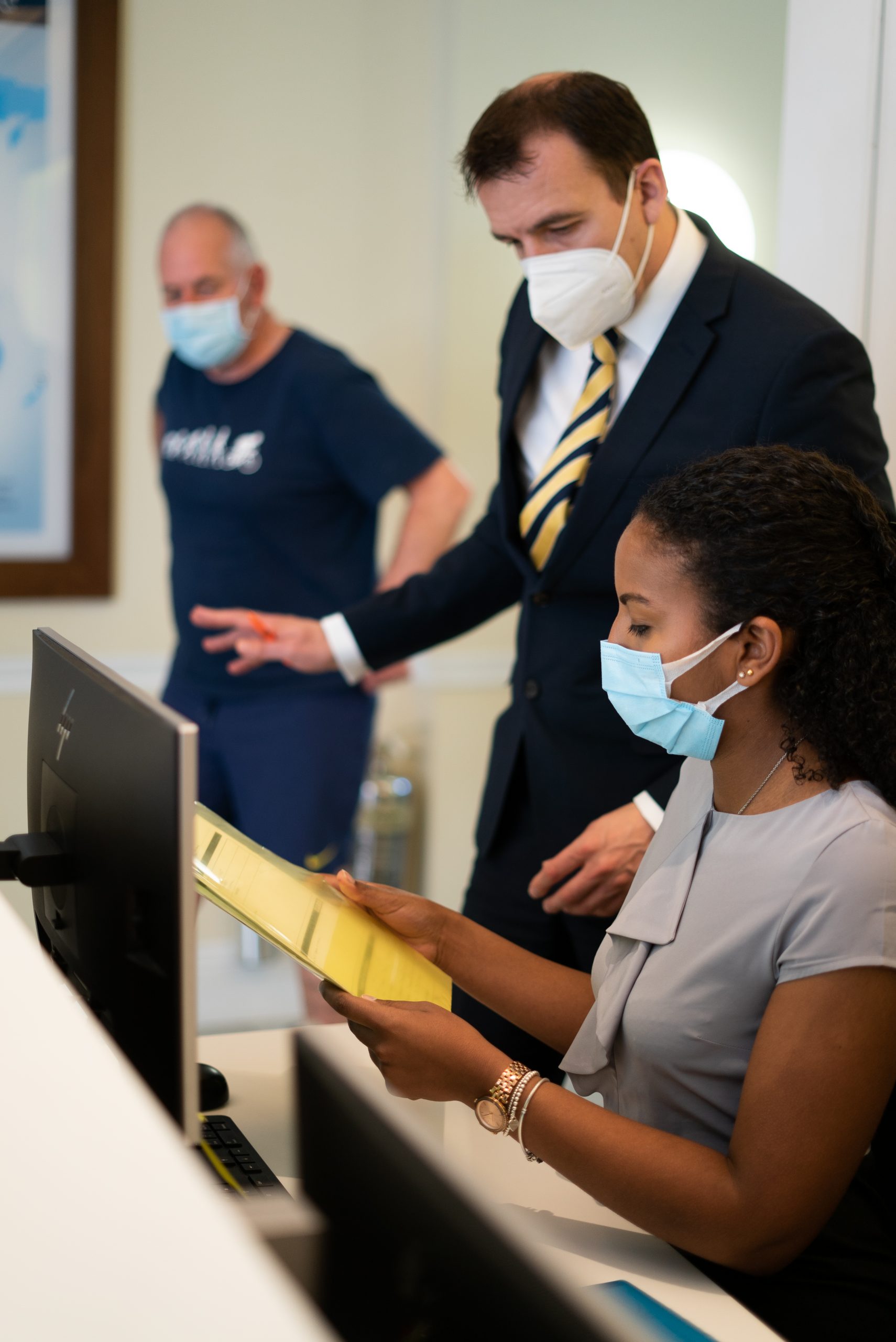
Why an osteopath or a chiropractor?
Osteopaths and chiropractors use a combination of manual therapy and highly specialised rehabilitation therapy, to not only to make you feel better quickly but to keep you there for good.
They focuses on joints, muscles, and spine, using hands for a non-invasive form of manual medicine that focuses on the health of the whole body, not just the injured or affected part. Osteopathy is a drug-free practice. ‘Hands-on’ techniques to improve circulation and correct altered biomechanics, without the use of drugs.
The main therapeutic tool in the Chiropractic/Ostheopatic practice is the correction of the spine, the pelvis and all of the other peripheral joints (foot, knee, shoulder, jaw). The Chiropractic practice is good for athletes, children, pregnant women and older people.
Difference between chiropractors an osteopaths
Chiropractic medicine and osteopathy have many points in common and are often confused: let’s clarify the similarities and differences of these two therapeutic approaches useful for motor rehabilitation and general health.
Chiropractic and osteopathy are two conservative manual therapies that aim to restore the body’s natural balance through manipulations with which to reactivate the correct vital functions and the self-care mechanisms available to everyone.
Osteopathy involves more extensive manipulation interventions aimed at the cranio-sacral, visceral and structural system, involving practically all areas of the body in the treatments.
Both disciplines have a holistic approach and consider the balance between all parts of the body and psyche to be the prerequisite for optimal health.
Chiropractic aims to restore this balance by acting on the central nervous system through manipulations of the spine and joints in general;
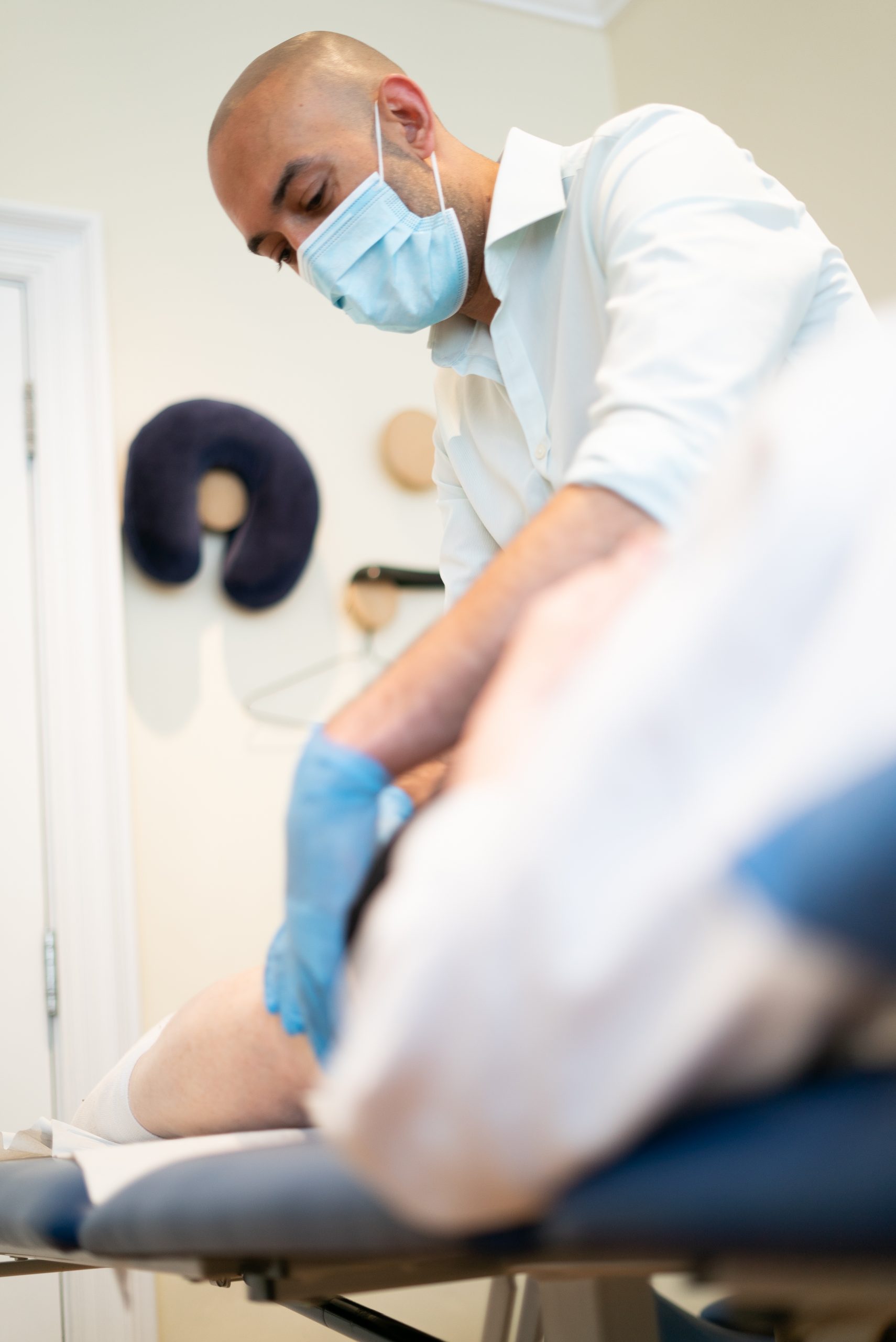
Although coming from the same methodological approach (the founder of chiropractic, Dr. Palmer, was a student of the founder of osteopathy, Dr. Still) and sharing the non-invasive nature of the treatments in order to obtain not only the resolution of the local problem but the reconquest of it and establishing total psycho-physical well-being. Chiropractors and osteopathy can offer differentiated supports for a rehabilitation path.
It is important, in both cases, to contact expert professionals with qualifying qualifications and undergo chiropractic or osteopathy sessions only after a thorough specialist visit and any clinical tests (radiographs, ultrasounds, etc.)
In short, in Isokinetic Italian Clinics you can find Chiropractors whilst in our London clinic you will find Osteopaths registered with the General Osteopathic Council (GOsC).
Request an Appointment
or book your first visit which will include an initial diagnosis,
a customised plan for medical care
and a rehabilitation programme designed to suit your unique needs.


